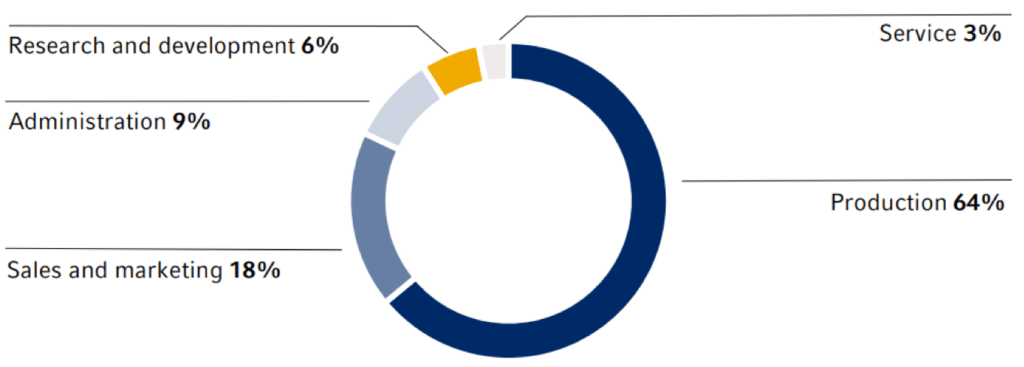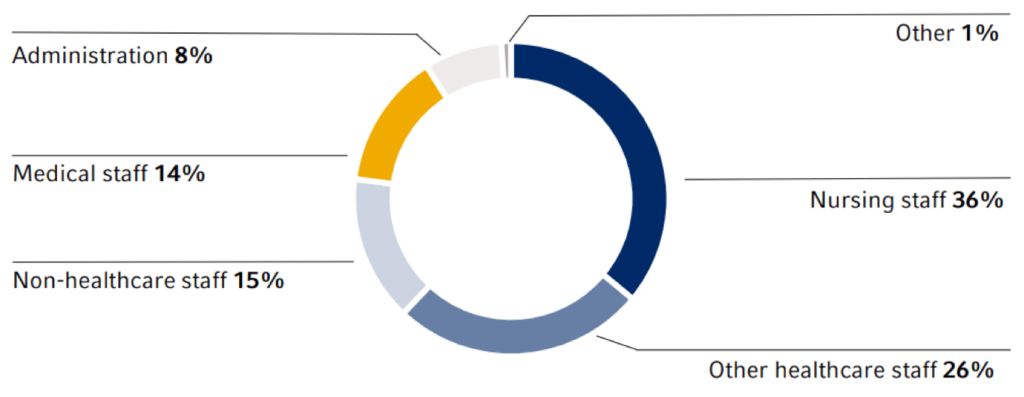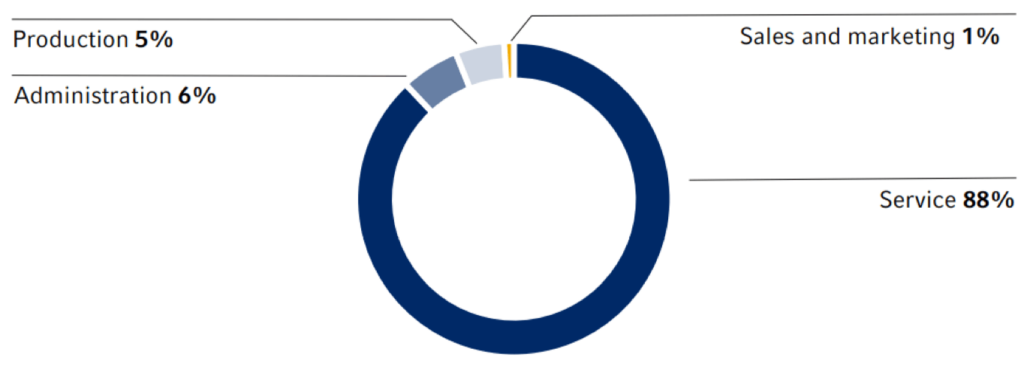The commitment of our more than 190,000 employees worldwide forms the basis of our success. Their achievements, skills, and dedication help our business segments to hold leading positions in their respective markets.
We have identified the following topics as material for the Fresenius Group, on which we report on the following pages:
- Working conditions
- Recruitment
- Employee development
- Employee retention
- Dialog and feedback formats
- Employee participation
Employee figures can be found here. Furthermore, we report separately on the key topics of occupational health and safety and diversity and equal opportunities. Occupational health and safety affects both employees and patients in our healthcare facilities. Diversity and equal opportunities have been identified as material to our company, and demonstrate their relevance in our Human Rights Statement and in the Human rights section.
Our goals and ambitions
Fresenius SE & Co. KGaA and its business segments pursue segment-specific ambitions. We want to build on the position of our business segments which focus on innovation in the healthcare sector and take account of the importance of the services they provide for society. Our aim in doing so is to attract new employees who contribute to the company’s success through their willingness to perform, their expertise, their experience, and their willingness to work together as a team. As a Group-wide goal, we have integrated the engagement of our employees as an indicator in the short-term variable compensation of the Management Board.
Employees goals
Download(XLS, 35 KB)| Timeframe | Status 2023 | Further information | |
|---|---|---|---|
| Employee Engagement Index: ≥ 4.33 | 2023 | 4.131 | Dialog and feedback formats |
| 1 The Employee Engagement Index is subject to an audit with reasonable assurance, as it is part of the short-term incentive (STI) of the Management Board compensation, as stated on pages 201 ff. in the Group Non-Financial Report. | |||
Our approach
We want to continue attracting, retaining, and integrating talents at Fresenius. To this end, we need to consolidate and build on our position as an attractive employer in a market environment characterized by a shortage of personnel. Employee-friendly working conditions, attractive benefits, and a dialog-oriented corporate culture all help us to achieve this.
Organization and responsibilities
Within the Group Management Board, the Group Management Board member responsible for, Legal, Compliance, Risk Management, ESG, Human Resources and the business segment Fresenius Vamed (subsequently ESG Board member) is responsible for steering strategic Group-wide goals and projects in human resources (HR). The Chief Executive Officers (CEOs) of the business segments are responsible for the operating tasks of their business segment. The management boards of the business segments define the management approaches and regulate responsibility for HR topics, for example, via a business allocation plan. In the Fresenius Group HR Steering Committee, the HR managers or responsible functions of the business segments and of the Group function Corporate HR Management align on a monthly basis on HR topics and decide on Group-wide projects and initiatives. The ESG Board member participates in the meetings. As part of risk reporting, the Management Board of the Fresenius Group is informed quarterly. It discusses the effectiveness of measures in the area of HR, if risks were identified or incidents occurred, that could have a material adverse effect on the operating business, reputation, or the value chain of the Group and its business segments. In 2023, for example, this related to the shortage of personnel in the healthcare sector. The Audit Committee of the Supervisory Board is informed about developments on a half-year basis, the Supervisory Board on an annual basis. Further explanations can be found in the Opportunities Risk Report and in the Group Non-financial Report in the Compliance section.
We explain the interaction between the Management Board, the Supervisory Board, and the employee representatives, e. g., the European Works Council, in the Employee participation section.
Fresenius Kabi: Employees by function

Fresenius Helios: Employees by function

Fresenius Vamed: Employees by function1

1 The category service relates to nurses and other specialized personnel in healthcare.
Reporting systems
Violations of regulations with reference to employees can be reported via the complaint channels described in the Compliance section. Furthermore, there is the possibility of informing the local employee representative body (works council), as far as they are established. How this is done is explained in the Employee participation section.
In the reporting year, no violations of internal policies with reference to employees were reported via our reporting channels whose impact would have been material for the financial position or reputation of the company. For more information on opportunities and risks, please refer to the Opportunities and Risk Report.
Guidelines and regulations
At Group level, the Code of Conduct forms the basis for day-to-day activities. Further segment-specific guidelines are derived from it. Within the Fresenius Group, there are a large number of guidelines that determine the working environment and the scope of activities of our employees. The respective content is the responsibility of the business segments and specialist areas. Collective bargaining agreements set further provisions regarding wage levels and further specifications for functions, as well as tariff groups. Apprentices, student trainees, and interns generally work on the basis of employment contracts, specified for their internship or apprenticeship. Our Group Policy on Social and Labour Standards is based on internationally recognized human and labour rights, namely the Universal Declaration of Human Rights and the two most important human rights instruments derived from it, the International Covenant on Civil and Political Rights (ICCPR) and the International Covenant on Economic, Social and Cultural Rights (ICESCR), as well as the Declaration on Fundamental Principles and Rights at Work of the International Labour Organization (ILO). The standards described in this guideline are our global social and labor law minimum standards. We expect our employees and managers in all business areas to fully comply with this guideline. Lower standards are not acceptable. If national laws or practices restrict or contradict the standards set out in this policy, we will nevertheless apply the policy to the extent permitted by local laws. Further information is provided in the Human rights section.
Within the Fresenius Group, applications are used to help us manage, evaluate, and control personnel data. We collect and analyze selected personnel data globally every quarter. The evaluations serve as information for various internal stakeholders, such as employee representatives. In this way, we create transparency with regard to the most important key figures. Furthermore, the key performance indicators in the HR Steering Committee enable joint decision-making, the derivation of measures where necessary, and an exchange of best practice examples in order to further develop HR management in our business segments.
Contact
Fresenius SE & Co. KGaA
Group ESG
sustainability@fresenius.com

